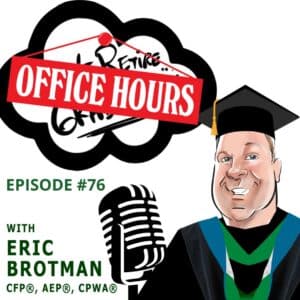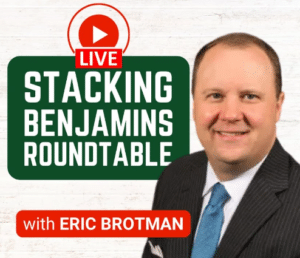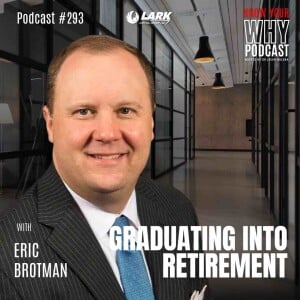In today’s Office Hours, Eric answers Alicia’s question: “Can money actually buy happiness?”
Over his 30-year career, Eric has seen people with more money than they could ever need who were miserable and some who were happy. The same can be said for those with more modest wealth. So what’s the answer?
Eric Brotman: [00:00:00] Welcome to Don’t Retire…Graduate, the podcast: that asks you what you want to be when you grow up so you can graduate into retirement with purpose and passion. I’m your host in valedictorian, Eric Brotman, and the question is: can money buy happiness? And office hours, episodes aren’t normally three hours, though we could talk about that for that long.
So in, in a word, the answer is no. Money most certainly cannot buy happiness. I have seen memes and other funny funny tales that say Money can’t buy happiness, but it can buy chocolate, and that makes me happy, and things like that. The reality is there’s no linear relationship between money and happiness.
Sadly, over my 30 year career, I have seen countless people, countless families, who not only have more money than you can, than you can necessarily imagine. But they’re miserable people, a lot of them. And unfortunately, that’s not to say there aren’t very happy wealthy people. There certainly are.
It really has [00:01:00] more to do with your, your purpose and your passion. And one of the reasons we talk about that so much on our show is that having the resources to be financially independent is a spectacular, quantifiable goal. And it’s great to hit financial independence to where work is optional and you have some freedom and flexibility and you can do the things you want to do.
But it’s critically important, Alicia, that you have things you want to do. And if you, if you work so hard and make so much money, but have no plan for how to use it, enjoy it, spend it, make a difference with it, you’ll find it’s just a number on a sheet of paper and it’s not particularly helpful to you. Anecdotally, I’ve known lots of folks who have very modest incomes, very modest net worth, who are incredibly happy people.
They have happy relationships and marriages and families and, and job situations and, and, There are certainly people on the other side of that coin who are, who are living paycheck to paycheck, struggling and not happy. [00:02:00] So I think we should dispel the myth that money buys happiness. It most certainly does not.
Money is a tool. It is a tool that can make life. Easier in some ways. Unfortunately, it’s also a tool that makes life more difficult in some ways. And you know, you’ve heard, you’ve heard it said mo money, mo problems. There’s some truth to that. When you have more resources, it creates a lot of different things that are, that are challenging for you.
Number one, it’s more to take care of, more to worry about, more to lose more to stress over number two. It creates relationships where sometimes you’re preyed upon, sometimes you have to worry if someone’s being nice to you because they want something from you, as opposed to they enjoy your company.
It makes going into a marriage more difficult because if one party or the other is wealthy, there’s always that, that creeping sense in the back of your mind. Is this person doing it for the money and do we need to talk about really romantic things like prenuptial agreements? And so I, I do believe that setting [00:03:00] goals for yourself, for financial independence are worthwhile.
I do not think that that will make you a happier person. I think it makes you more flexible. I think it gives you more opportunities in some ways, but you have to innately. The reason to get out of bed every morning and the reason to be enthusiastic about your day, your week, your life, your home, your family, your job, whatever it is that’s important to you, that is so much more important than having a big balance on your statement.
You know, it’s been said that he who dies with the most toys wins. And I don’t think that’s true. I’ve never thought that’s true. I think he who dies with the most toys still dies and may not have played with them all, and it’s very sad. And so for, for those couples and individuals and families who have amassed wealth, but don’t take the trip, don’t do the vacation, don’t make the donation that’s important to them, and you’re not doing the things that bring you joy.
You’ll be a very wealthy, very unhappy. And it’s just simply not worth it. [00:04:00] So I don’t think money is the root of all evil. I don’t think it causes unhappiness. I also don’t think it allows you to buy happiness. So, Alicia, I hope I helped you. We could talk for hours about this. And, and, and sometime I hope I’ll get an opportunity to do a full show on this because I really do think it’s powerful.
The things that, that make people happy are not the same things that make people. And there is no relationship between the two that I have ever seen in behavioral finance or psychology or anyplace else. So in a word, the answer is no. Thank you so much, Alicia, for your question. If you’d like to send us a question, which we might answer in a future episode of Office Hours, please post it on our Facebook page or tweet us at Rotman Planning.
Thank you all for listening and watching today. We’d love to hear from you. Send us a message or leave us comments at don’t retire graduate.com or on social media or leave ratings and reviews on your favorite podcast platform. Those are priceless to us. I thank you for coming to Office Hours and hope you’ll tune in next Thursday for great content.
For now, this [00:05:00] is your host, Eric Brotman, reminding you don’t retire. Graduate
Narrator: Securities offered through Kestra Investment Services, LLC. (Kestra IS) Member Finra, S I P C. Investment advisory Services offered through Kestra Advisory Services, LLC. (Kestra AS) an affiliate of Kestra IS. Kestra IS or Kestra AS are not affiliated with Brotman Financial or any other entity discussed.







